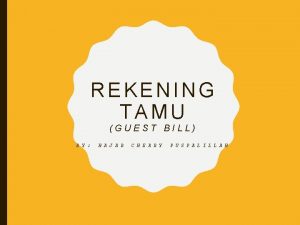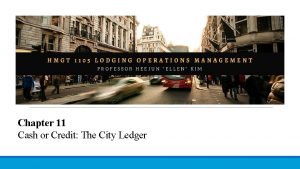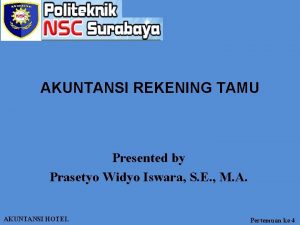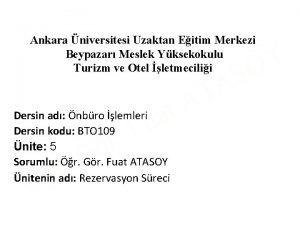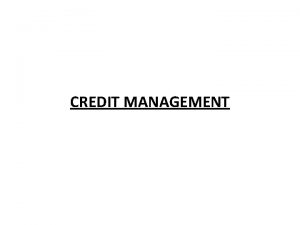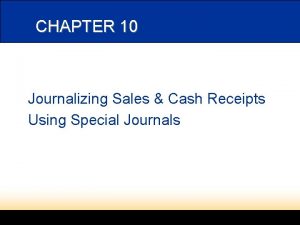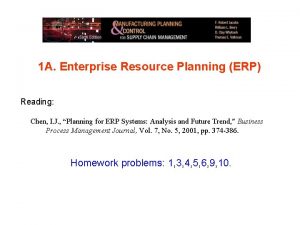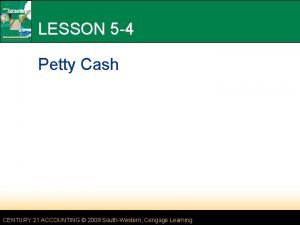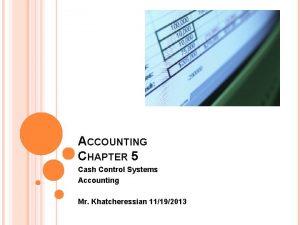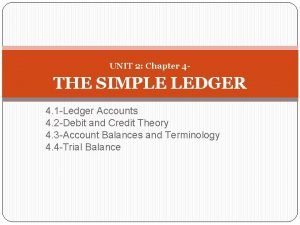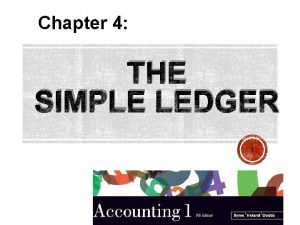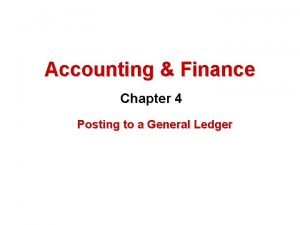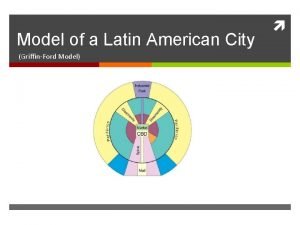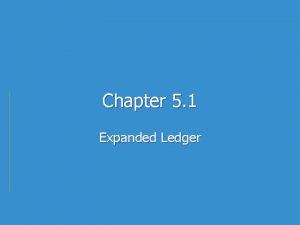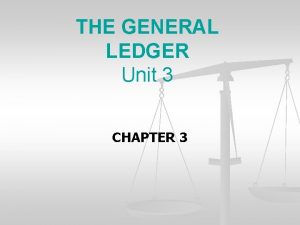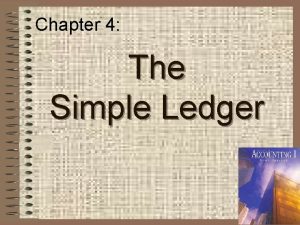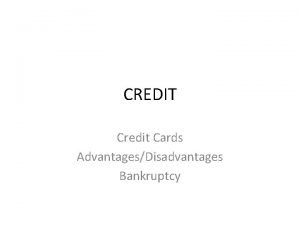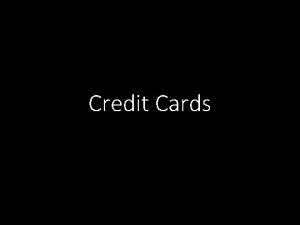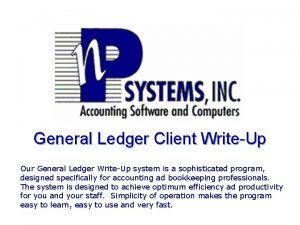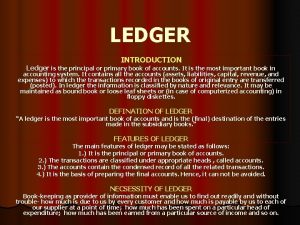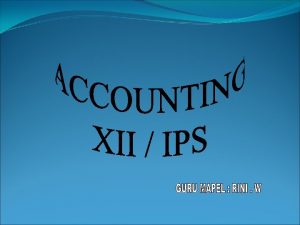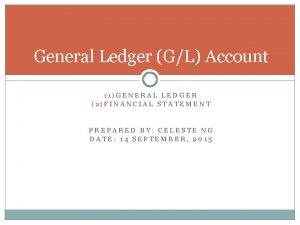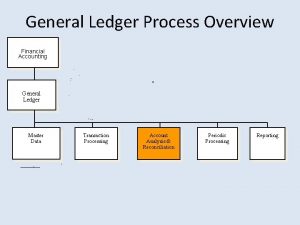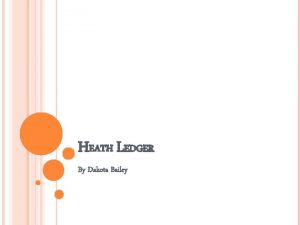Chapter 11 Cash or Credit The City Ledger



















- Slides: 19

Chapter 11 Cash or Credit: The City Ledger

Learning Objectives

Cash (1 of 7) Cash Paid Outs ◦ When cash is taken out of the F. O. cash and “paid out” to someone (Employee, Guest, Vendor, Manager etc. , ) ◦ Tips to employees ◦ Most common form of cash “paid out” at FO ◦ Guest adds the tip amount and signs the check. ◦ Tip is paid out on the same day to the employee ◦ Employee signs the “Cash Advance Voucher” for this ◦ Cost to the Hotel: Float ◦ Hotel gets money later, pays employee up-front! ◦ Cost to the Hotel: Discount fees ◦ Hotel has to pay fee to VISA or AMEX, but does not reduce tip!

Cash (2 of 7) ◦ Cost to the Hotel: uncollectible accounts ◦ If the bill is not paid, hotel cannot recover tip already paid out! ◦ Another look at the employee tips ◦ All the above can end up costing the hotel a lot of money! ◦ Cash Loans ◦ A loan given to a guest from FO cash ◦ Common earlier for taxi fare, similar small amounts ◦ Not a good idea for large amounts ◦ Very rare these days with ATMs and Credit Cards ◦ Third party sources of cash ◦ Encourage guests to use ATMs, get a loan on their credit card, or use wire services like Western Union

Cash (3 of 7) ◦ Automatic Teller Machines(ATMS) ◦ Dispense cash world-wide in local currencies ◦ ATMS in Hotel Lobbies ◦ Source of revenue for hotel as ATM company pays a fee ◦ Encourages guests to spend more money in the hotel! ◦ Paid outs to concessionaries ◦ Hotel pays the Dry-Cleaner or Hairdresser and charges it to guest account as a “Paid Out” ◦ Guest pays on departure ◦ Refunds at Check-out ◦ If the guest paid a large advance up-front and has money left over, they are refunded as a “paid out” ◦ Have a limit of $100 or so in cash to avoid fraud!

Cash (4 of 7) ◦ House expenses Cash Receipts ◦ House Receipts The Cashier’s Daily Report ◦ The Bank ◦ A permanent supply of cash received by the FO cashier for daily use ◦ Net Receipts ◦ The difference between money taken in and paid out ◦ Total Receipts – Total Payments = Net Receipts

Cash (5 of 7) ◦ Over or Short ◦ Difference between “What should be” and “What is” ◦ ◦ “What should be” = Cash according to accounts “What is” = Actual cash in dollars and cents in the cash drawer “Over” = More money in cash drawer than should be “Short” = Less money in cash drawer than should be ◦ Differences due to errors, over/under payments, fraud ◦ The Turn-In ◦ The cashier turns in the actual cash, along with the Cashiers Report, accounting for “over” and “short” ◦ The cashier turns in the actual cash and an auditor does the accounts

Cash (6 of 7) ◦ Due Back ◦ Refunding the Due Back ◦ Refunding House Vouchers Other Related Issues ◦ Tour Package Coupons ◦ Coupons used by members of tour groups to “pay” for meals, etc. ◦ Must be accounted for like regular cash

Cash (7 of 7) ◦ Foreign Currency ◦ Normally not accepted in US hotels ◦ Canadian $ may be accepted close to Canadian border ◦ Online reservation systems generally show the rates to the potential guests in the currency of their choices ◦ Some hotels provide money-changing facilities at FO ◦ Rarer in US than in most other countries ◦ In India, even small hotels change currency at FO ◦ Currency exchange restricted to “major” currencies ◦ Can be profitable for hotel, but has its own risks! ◦ USA hotels refer customers to specialized money changers ◦ Automated Currency Conversion Systems ◦ Example from the Land of Nod

Credit and The City Ledger (1 of 2) Review of the City Ledger Credit Cards ◦ History ◦ ◦ ◦ Started in the USA in 1915 Became big in 1950 with the founding of Diners Club American Express (AMEX) founded in 1958 Bank. Americard in 1960, becoming VISA later Master. Card in 1970 Hotel chains started issuing their own credit cards, but dropped the idea later with increasing acceptance of general cards

Credit and The City Ledger (2 of 2) ◦ Kinds of Credit cards ◦ How the system works ◦ Customers get convenience, float, credit, security ◦ Debit cards and smart cards ◦ Debit cards ◦ Transfer funds instantly from customers bank account ◦ No float for customer, less fees for merchants ◦ Smart cards ◦ Credit cards with memory chips that can store other information ◦ ID, medical info, insurance info, etc. ; becoming more popular ◦ Still other cards

Other City-Ledger Categories (1 of 4) Master Accounts ◦ Accumulate charges for groups ◦ Four common errors that irritate meeting planners ◦ ◦ Split billing Unauthorized signatures The sequence of posting Comp rooms Groups, Packages, and Company Sponsored Functions

Other City-Ledger Categories (2 of 4) ◦ Individual “Direct Bill” City-Leger Receivables ◦ The Original City-Ledger Accounts ◦ Travel Agencies (TAs) ◦ A travel agency can become an account receivable in the city ledger when guest pays the first night’s room charge with the travel agency’s coupon ◦ Banquet Charges ◦ An open account created by a catered party in the hotel, that a guest pays after-the-fact ◦ Credit Cards are increasingly replacing this ◦ Late Charges ◦ Charges that appear on the folio after the guest has checked out ◦ May be “written off” as un-collectible if amount is to small to pursue

Other City-Ledger Categories (3 of 4) ◦ Delinquent Accounts ◦ Accounts that have not been paid in a long time ◦ May be transferred to “Bad Debts” account and “written off” if found to be uncollectible ◦ Executive Accounts ◦ Personal account of Managers in the hotel ◦ May receive discounts for hotel services ◦ Need to distinguish “personal” and official entertainment ◦ Due bills or Trade Advertising Contracts or Trade-outs or Reciprocal Trade Agreements ◦ Hotels trade their room nights for other services like newspaper or TV advertising ◦ The voucher issued by the hotel is often traded like real money! ◦ The guests presents the Due Bill on check-in for payment

Other City-Ledger Categories (4 of 4) ◦ Frequent (Preferred) Guest Programs ◦ Hotel company is billed for the room rate on the A folio ◦ Guest is billed for other personal charges on B folio

Managing Cash and Credit (1 of 2) Managing Cash ◦ Counterfeit Currency ◦ ◦ It is a very real problem Hotels are targets as FO is busy and easy to cheat Important to train cashiers to detect fake currency Can buy devices that detect fake bills Managing Check ◦ Three Quickies ◦ Simple Deterrents

Managing Cash and Credit (2 of 2) ◦ Traveler’s Checks ◦ ◦ ◦ Issued by AMEX and other issuers, As good as cash Cashed with a verifying signature Train employees in proper procedures, fraud detection Be careful about Canadian/Australian/ other dollars! Less popular now with increasing ATM, credit card use.

A Cost/Benefit Decision (1 of 2) If you do not extend credit you will certainly have no losses due to “bad debts”, skippers, etc. However, you will also miss out on good business that was turned or scared away by your rigid credit policies Collecting, Billing, and Dunning

A Cost/Benefit Decision (2 of 2) Minimizing Chargebacks ◦ When the credit card company refuses to pay the bill ◦ The guest refuses to pay (No-show fees etc. , ) ◦ The hotel did not follow card company procedures ◦ How to minimize them… ◦ Communicating charges/fees clearly to the guest ◦ Avoiding “late charges” by better training and good systems ◦ Training employees in following correct procedures
 Supporting bill
Supporting bill City ledger
City ledger Rekening tamu
Rekening tamu Overbooking nedir
Overbooking nedir This can be avoided by giving credit where credit is due.
This can be avoided by giving credit where credit is due. What are the cash flows from granting credit
What are the cash flows from granting credit Usbank total rewards
Usbank total rewards Recorded cash and credit card sales
Recorded cash and credit card sales Cash received journal
Cash received journal Cash to cash cycle time
Cash to cash cycle time Cash to cash cycle time
Cash to cash cycle time Cash in cash out example
Cash in cash out example The essentials of effective budgeting do not include
The essentials of effective budgeting do not include Paid cash to establish a petty cash fund
Paid cash to establish a petty cash fund Paid cash to replenish the petty cash fund
Paid cash to replenish the petty cash fund The simple ledger chapter 4
The simple ledger chapter 4 The simple ledger chapter 4
The simple ledger chapter 4 Posting to a general ledger chapter 4
Posting to a general ledger chapter 4 Post. ref. accounting
Post. ref. accounting Griffin-ford model definition
Griffin-ford model definition
